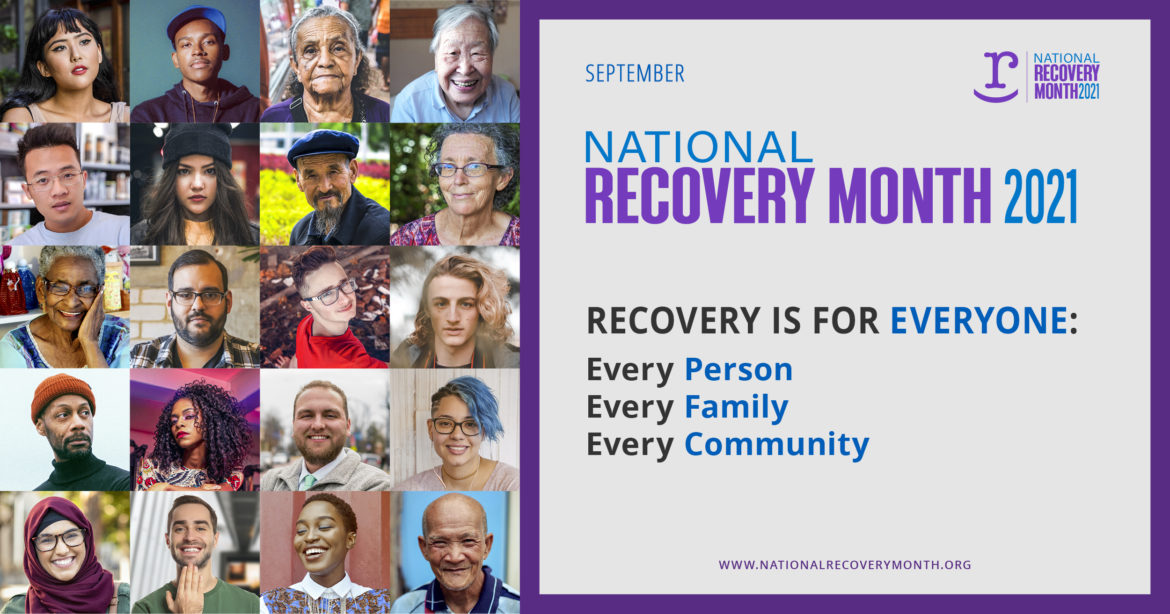Addiction can be a debilitating disease that affects not only the individual but also their family members and friends. At South Miami Recovery, we work with people who are addicted every day, helping them to move forward toward a successful recovery. During National Recovery Month at South Miami Recovery, we want everyone to understand how to take steps to recover from an addiction to drugs or alcohol, to live a healthier life.
September is National Recovery Month
The month of September is designated as National Recovery Month, a time to recognize the gains made by those in recovery and to promote evidence-based treatment and recovery practices. Recovery Month is now in its 32nd year and continues to remind everyone that they are not alone in their journey toward a healthier life. In 2021, the theme of National Recovery Month is “Recovery is For Everyone: Every Person, Every Family, Every Community.”
Overcoming the stigma of getting help for an addiction is a critical focus of the month’s activities. Educating everyone about substance use disorders and co-occurring mental health issues is important in ensuring that each person understands that recovery is possible for them. Everyone struggles but there is help and hope available at recovery treatment centers such as South Miami Recovery.
Presidential Proclamation: National Recovery Month
The White House issued a Proclamation on National Recovery Month, 2021, that stated, in part:
“During National Recovery Month, we celebrate the millions of Americans who have achieved recovery and reaffirm our commitment to helping more Americans overcome substance use disorder and reach recovery. We also support those who are still struggling to achieve recovery and dedicate ourselves to overcoming these challenges together.
“This year’s theme, ‘Recovery is For Everyone: Every Person, Every Family, Every Community,’ emphasizes that recovery is possible for all Americans.
“Everyone can support and encourage those working toward recovery.”
Addiction is Treatable
Addiction is a treatable disorder. Research-based methods help people stop using drugs and alcohol and address the underlying causes of their addictive behaviors so they can begin to once again lead productive, fulfilling lives. This process of overcoming the addiction is known as recovery.
Addiction is a chronic disease, just like asthma or heart disease. It may not be curable, but the symptoms can be managed successfully in recovery. Learning how to live in recovery can help an individual counteract the disruptive effects that addiction has had on their brains and behavior so they can regain control of their lives.
The Recovery Process
Effective addiction treatment addresses the whole person to improve their mental and physical health. Treatment typically includes changing deeply rooted behaviors, which can be challenging. Sometimes the person can relapse but that doesn’t mean they have failed, or that their treatment has failed. They may need their treatment program readjusted or they may need to re-enter a program.
Stopping the use of drugs or alcohol is just part of the long and complex recovery process. Addiction can cause serious consequences in a person’s life, often disrupting their daily functioning at work and at home. It can also cause significant health issues that will also need to be addressed.
The Need to Overcome the Stigma and Get Help
When an individual perceives obstacles to getting help, including the stigma associated with addiction treatment, it can result in devastating consequences. At South Miami Recovery, we believe that everyone should be able to access affordable addiction treatment. In the spirit of National Recovery Month, we believe that recovery is for everyone.
Particularly in light of the devastating overdose statistics, it is critically important for the individual who is addicted to get the help they need as soon as possible. The CDC states that almost 841,000 people have died from a drug overdose since 1999. In 2019 alone, there were over 70,000 drug overdose deaths in the US.
Opioids are the main driver of drug overdose deaths. Almost 73% of opioid-involved overdoses involve synthetic opioids such as fentanyl. In 2019, opioids were involved in almost 50,000 overdose deaths. Overdoses involving psychostimulants, including methamphetamine, are increasing with and without synthetic opioid involvement.
South Miami Recovery is Here to Help
At South Miami Recovery, we understand the struggles of addiction and the importance of recovery. If you recognize the signs and symptoms in yourself or your loved one, please contact us for help. Our professional staff includes certified substance abuse therapists and licensed mental health professionals. We offer HIPAA-compliant telehealth services as well as safe outpatient services during COVID-19 so you can get the help you need. To learn more, contact us today. Call South Miami Recovery at 305.661.0055.









